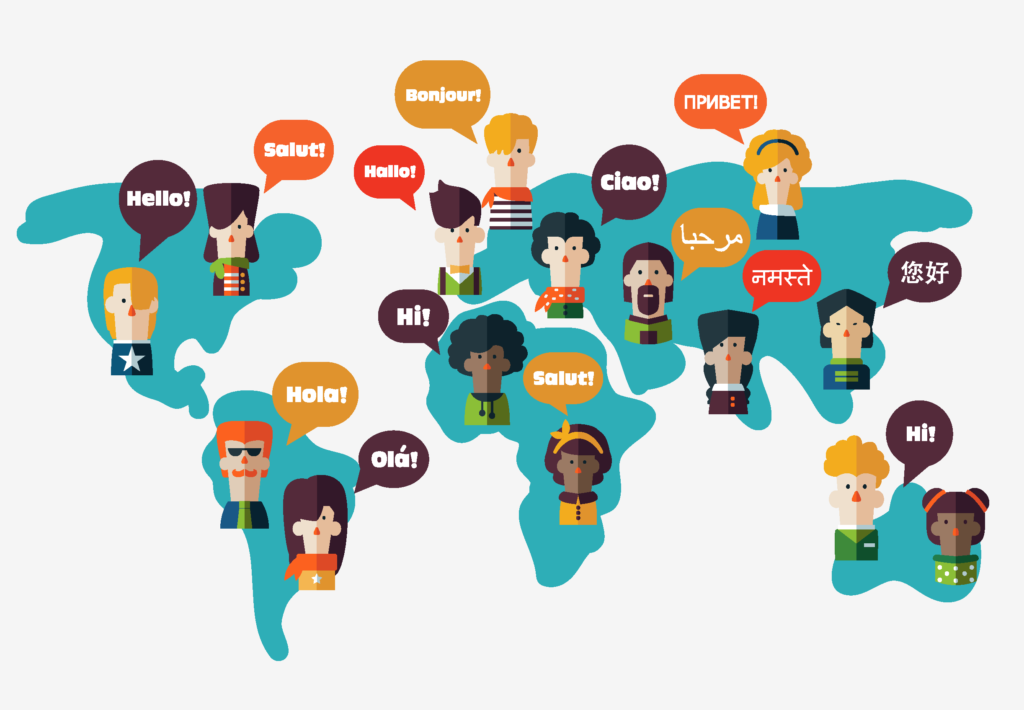The Beauty and Benefits of Linguistic Diversity: Why Different Languages Matter and What We Lose with Uniformity
In an era of rapid globalization and digital connectivity, the importance of understanding and valuing linguistic diversity cannot be overstated. At Abalingua Global Solutions, where we specialize in providing high-quality interpreters and interpreting equipment, we recognize that languages are more than mere tools for communication. They are vital elements of our cultural identities, repositories of knowledge, and keys to a richer global interaction. This blog post delves deeply into why languages differ, the myriad benefits of this diversity, and the potential downsides of a world where everyone spoke a single language.

The Origins of Linguistic Diversity
Human language is a fascinating tapestry woven through millennia of cultural and social evolution. The reasons behind the vast number of languages in existence today are rooted in historical, geographic, and social factors:
Geographic Isolation and Development
Historically, human populations spread across the globe in a pattern dictated by geographical barriers such as mountains, rivers, and oceans. These natural obstacles often isolated communities from one another, leading to the development of distinct languages. For example, the various indigenous languages of the Americas evolved independently after the initial migration of humans across the Bering Strait, each shaped by unique environmental contexts.
Cultural Evolution and Expression
Languages evolve in tandem with the cultures they serve. As societies grow and change, so do their languages, which adapt to new cultural norms, technologies, and ideas. The evolution of language reflects the history, beliefs, and values of a society. For instance, the rich vocabulary found in the Inuit languages for snow and ice is a direct result of the environment’s significance to their culture.
Social Structures and Communication Needs
Language is often shaped by social structures and communication needs within a community. As social groups formed and diversified, so did their languages, developing specialized vocabularies and expressions to suit their unique circumstances. This linguistic specialization can be seen in the jargon and slang used within professional fields or subcultures.
Migration and Contact
The movement of peoples—whether through migration, conquest, or trade—has also played a crucial role in the development of languages. Contact between different linguistic groups often leads to language borrowing and the creation of pidgins and creoles, as seen in the history of languages such as Swahili and Tok Pisin.
The Multifaceted Benefits of Linguistic Diversity
Linguistic diversity is not merely an academic curiosity but a vital component of our shared human experience. Here’s why it matters so much:
Cultural Enrichment and Preservation
Languages are carriers of culture and tradition. Each language encapsulates a wealth of knowledge, customs, and historical experiences unique to its speakers. For example, many indigenous languages have intricate systems of oral history that convey traditional ecological knowledge crucial for understanding sustainable practices. The preservation of these languages helps maintain the cultural richness and diversity of our world.
Cognitive Advantages
Research has consistently shown that multilingual individuals tend to have enhanced cognitive abilities. The mental exercise of learning and using multiple languages improves problem-solving skills, creativity, and cognitive flexibility. Multilingualism is associated with a delay in the onset of age-related cognitive decline and increased aptitude for learning additional languages.
Economic Growth and Opportunities
In today’s globalized economy, the ability to communicate in multiple languages is a significant asset. Businesses that operate in diverse linguistic markets can engage more effectively with a broader customer base, tailor their products and services to different cultural contexts, and tap into new economic opportunities. Language skills also play a crucial role in international diplomacy, trade, and cross-border collaborations.
Enhanced Global Understanding and Cooperation
Language is fundamental to human connection and empathy. The ability to understand and appreciate different languages fosters global understanding and cooperation. Interpreters and translators bridge linguistic divides, enabling people from various backgrounds to collaborate on international projects, resolve conflicts, and address global challenges together.
Intellectual and Creative Diversity
Different languages offer unique perspectives on the world, shaping how their speakers think and perceive reality. For example, some languages have specific terms or concepts that do not exist in others, providing alternative ways of understanding and interacting with the world. This diversity in thought contributes to intellectual and creative innovation, driving progress in arts, science, and technology.
The Potential Downsides of a Single Global Language
While the idea of a universal language might seem appealing for its potential to simplify communication, it comes with several significant drawbacks:
Erosion of Cultural Identity
Languages are closely tied to cultural identity and heritage. A single global language could lead to the loss of countless languages and, by extension, the cultures and traditions they represent. The unique expressions, stories, and knowledge embedded in diverse languages would be at risk of disappearing, resulting in a homogenized cultural landscape.
Loss of Cognitive Benefits
The cognitive advantages associated with multilingualism might be diminished in a world with a single language. The mental flexibility, problem-solving skills, and enhanced executive functions that come from navigating multiple languages would be lost, potentially limiting individual cognitive development and creativity.
Economic Disruption
The global language industry—encompassing translation, interpretation, and language education—represents a substantial economic sector. A single universal language could disrupt these industries, leading to job losses and economic shifts. The specialized skills of translators and interpreters, who play a crucial role in facilitating international communication, would be less in demand.
Homogenization of Perspectives
Language shapes how we think and perceive the world. A universal language might lead to a homogenization of thought, where diverse perspectives and ways of understanding are flattened into a singular viewpoint. This could stifle creativity and reduce the richness of global intellectual and cultural exchange.
A Snapshot of Global Linguistic Diversity
To illustrate the range of linguistic diversity, here are examples of the most spoken and least spoken languages worldwide:
Most Spoken Languages
1. Mandarin Chinese
– Native Speakers: Approximately 1.1 billion
– Total Speakers: Around 1.2 billion
– Regions: China, Taiwan, Singapore
2. Spanish
– Native Speakers: About 460 million
– Total Speakers: Approximately 560 million
– Regions: Spain, Latin America (excluding Brazil), parts of the United States
3. English
– Native Speakers: Around 380 million
– Total Speakers: About 1.5 billion
– Regions: United States, United Kingdom, Canada, Australia, New Zealand, and various other countries
4. Hindi
– Native Speakers: Around 340 million
– Total Speakers: Approximately 600 million
– Regions: India, Nepal, Fiji

5. Arabic
– Native Speakers: About 310 million
– Total Speakers: Approximately 420 million
– Regions: Middle East and North Africa
6. Bengali
– Native Speakers: Approximately 230 million
– Total Speakers: Around 250 million
– Regions: Bangladesh, India (West Bengal)
7. Portuguese
– Native Speakers: Around 220 million
– Total Speakers: Approximately 260 million
– Regions: Portugal, Brazil, Mozambique, Angola, and other Lusophone countries
8. Russian
– Native Speakers: About 154 million
– Total Speakers: Around 258 million
– Regions: Russia, Belarus, Kazakhstan, parts of Ukraine
9. Japanese
– Native Speakers: Approximately 125 million
– Total Speakers: Around 125 million
– Regions: Japan
10. Punjabi
– Native Speakers: About 125 million
– Total Speakers: Approximately 130 million
– Regions: India (Punjab), Pakistan (Punjab)
Least Spoken Languages
1. Taushiro
– Native Speakers: Fewer than 10
– Regions: Peru
2. Lemerig
– Native Speakers: Fewer than 10
–Regions: Vanuatu
3. Ongota
– Native Speakers: Fewer than 10
– Regions: Ethiopia
4. Kawthoolese
– Native Speakers: Fewer than 15
– Regions: Papua New Guinea
5. Sika
– Native Speakers: Fewer than 20
– Regions: Papua New Guinea
6. Nganasan
– Native Speakers: Approximately 30
– Regions: Russia (Siberia)
7. Ainu
– Native Speakers: Fewer than 15
– Regions: Japan (Hokkaido)
8. Māori (Kaikohe dialect)
– Native Speakers: Fewer than 30
– Regions: New Zealand (specific dialect)
9. Kuku-Yalanji
– Native Speakers: About 40
– Regions: Australia
10. Yuchi
– Native Speakers: Around 60
– Regions: United States (Oklahoma)
Celebrating and Supporting Linguistic Diversity
At Abalingua Global Solutions, we are dedicated to fostering communication and understanding across linguistic divides. Our services—ranging from professional interpretation to state-of-the-art interpreting equipment or written translation—are designed to bridge language barriers and promote global dialogue.
By supporting linguistic diversity, we contribute to a world where cultural heritage is preserved, cognitive and creative capacities are nurtured, and economic opportunities are expanded. We believe that celebrating and embracing the multitude of languages spoken around the world enriches our collective human experience.
In conclusion, the diversity of languages is a testament to human creativity, adaptability, and cultural richness. While the concept of a universal language might offer some theoretical benefits, the real value lies in preserving and celebrating our linguistic diversity. Each language adds to the vibrant tapestry of human experience, providing unique insights, fostering connections, and driving progress. As we navigate an increasingly interconnected world, let us continue to cherish and uphold the linguistic diversity that connects us all.
For more information on how Abalingua Global Solutions can assist with your interpreting needs and support multilingual communication, please contact us. Together, let’s celebrate the beauty of our diverse languages and the opportunities they bring.




